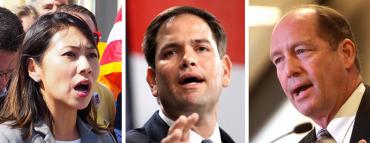
With North Korea conducting its sixth test of missiles this past weekend, members of the Florida delegation weighed in and offered their takes on the growing tensions with that nation.
From his perch on the U.S. Senate Foreign Relations Committee, U.S. Sen. Marco Rubio, R-Fla., ripped into the North Korean regime for continuing to explore developing nuclear weapons.
“North Korea’s threatening actions today are a sober reminder that all nations, including China, must do everything in their power to stop and reverse Pyongyang’s growing nuclear and missile programs,” Rubio said on Sunday. “We cannot live in a world held hostage by Kim Jong Un’s nuclear blackmail, and I support U.S.-led international efforts to maximize pressure against the North Korean regime and its foreign enablers.”
Over on the other side of Capitol Hill, U.S. Rep. Ted Yoho, R-Fla., the vice chairman of the U.S. House Foreign Affairs Committee and the chairman of its Asia and Pacific Subcommittee talked with the Washington Examiner and said there would be more “arm sales” to Japan as it looks to defend itself from North Korea aggression. In an article published early Wednesday, Yoho told the Washington Examiner that Japan would be receiving more F-35s from the United States.
On Tuesday, freshman U.S. Rep. Stephanie Murphy, D-Fla., who sits on the U.S. House Armed Services Committee and is a co-chairs of the House Democratic Caucus’ National Security Task Force, spoke at the Center for Strategic and International Studies (CSIS) on the U.S.-South Korea alliance and the North Korean threat.
Taking aim at the “unpredictable and dangerous regime in North Korea,” Murphy offered her take on the most recent nuclear test.
“This is a profoundly dangerous, defiant, and destabilizing event,” Murphy said in her speech. “As expected, the test has generated verbal condemnation from the international community, including China and Russia. But it is too early to say whether these strong words will be followed by strong actions and, if so, what those actions will entail—and whether they will make any difference in altering North Korea’s strategic calculus. Meanwhile, North Korea continues to develop and test missile delivery systems of increasing range and sophistication, having already conducted approximately 16 separate tests this year alone. Tests conducted in July led the U.N. Security Council, including China and Russia, to vote unanimously to tighten existing sanctions and to impose strict new sanctions on Pyongyang, which is certainly cause for cautious optimism.
“However, it remains to be seen whether these new sanctions will be adequately enforced, especially by Beijing, who accounts for upwards of 85 percent of North Korea’s international trade.” she continued. “It also remains to be seen whether the Security Council will agree to strengthen these sanctions even further in light of North Korea’s latest nuclear test. More generally, it is unclear what precise impact sanctions will have on North Korea’s economy and on the regime’s inclination, if any, to negotiate a nuclear freeze or reversal in exchange for some degree of sanctions relief.
“In the short-term, North Korea responded to the new sanctions in its typical fashion, firing a missile last month that flew over Japan, further contributing to the anti-pacifist trend underway in that country. And, of course, North Korea proceeded with its latest nuclear test in the face of broad international opposition. The reality is that we are now in truly uncharted territory here, and we have not yet cracked the code on how to influence decision-making in Pyongyang," Murphy added. “North Korea’s evident goal is to develop an arsenal of nuclear-tipped ballistic missiles that can reliably hit the U.S. territory of Guam, the U.S. state of Hawaii, and eventually the U.S. mainland.”
Murphy insisted that the Kim regime was trying to split the U.S. from its allies in the region, especially South Korea, with its continued testing.
“I believe Kim is making a fundamental miscalculation,” Murphy said. “If anything, the increasing threat to the U.S. homeland posed by North Korea should bring the United States and South Korea closer together, not drive a wedge between us—because our fates are so closely intertwined. U.S. policymakers must make crystal clear that the U.S. commitment to South Korea, and the importance that Washington attaches to cooperation with Seoul, is stronger than ever.”
Murphy expressed concerns over a number of vacancies in key positions at the State and Defense departments, including no ambassador to South Korea, no assistant secretary in the State Department’s Bureau of East Asian and Pacific Affairs, no assistant secretary of Defense for Asian and Pacific Security Affairs and no deputy assistant secretary of Defense for East Asia.
“I mean absolutely no disrespect to the individuals who may be holding these positions on an interim or acting basis; some of them are excellent. But we all know that Senate confirmation provides enhanced credibility and stability,” Murphy said. “When it comes to international affairs in general and alliance preservation in particular, personnel is policy. I am heartened that irresponsible individuals like Steve Bannon and Sebastian Gorka have departed the administration, and that experienced national security professionals like White House Chief of Staff John Kelly, Secretary of Defense James Mattis, and National Security Advisor H.R. McMaster seem to be gaining in influence. Nevertheless, the fact remains that you need subject-matter experts in place at every level of the national security bureaucracy to develop and execute policy, to reassure allies, and to deter adversaries. The administration has been severely lacking in this respect.”
Murphy also called out President Donald Trump for his rhetoric, including his social media posts, on North Korea.
“f there were any event whose gravity called for a thoughtful, deliberate, sober-minded response not limited to 140-characters, this was it,” she said. “Unfortunately, the president turned yet again to social media.”
Murphy also urged the Trump administration to continue the free trade agreement with North Korea.
READ MORE FROM SUNSHINE STATE NEWS
Allen West Gets Politically Active Again, Vows to Help 'Constitutional Conservatives'


